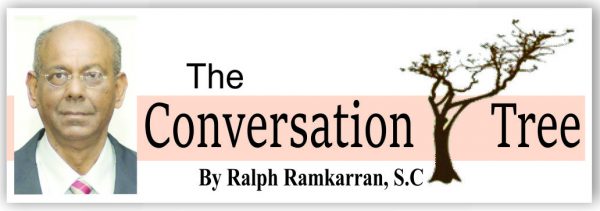 Contradicting what appears to be the unanimous prevailing view that dual citizenship prohibits a Guyanese from being a member of the National Assembly, Counsel in the case brought by Christopher Ram argues to the contrary. Ram’s case was brought against the Attorney General and the Leader of the Opposition. He is seeking a declaration that the Cabinet, including the President resign in compliance with Article 106(7) of the Constitution having regard to the no confidence motion passed by a majority of 33-32 in the National Assembly on December 21 under Article 106(6).
Contradicting what appears to be the unanimous prevailing view that dual citizenship prohibits a Guyanese from being a member of the National Assembly, Counsel in the case brought by Christopher Ram argues to the contrary. Ram’s case was brought against the Attorney General and the Leader of the Opposition. He is seeking a declaration that the Cabinet, including the President resign in compliance with Article 106(7) of the Constitution having regard to the no confidence motion passed by a majority of 33-32 in the National Assembly on December 21 under Article 106(6).
Extensive submissions have been made in relation to the directly relevant issues of the meaning and effect of Article 106(6) of the Constitution, the interpretation of what a ‘majority’ is, and whether Charrandass Persaud was a lawful member of the National Assembly at the time he voted. But as a tangential issue, Counsel argues that a dual citizen can be a lawful member of the National Assembly. This submission will certainly please and probably attract the support of the PPP and APNU+AFC, both of which parties have representatives in the National Assembly who have dual citizenship. If the Court rules directly or indirectly that dual citizenship disqualifies a person from being a member of the National Assembly, it will cause significant disruption as well as exclude prominent members of the PPP and the APNU+AFC coalition from the National Assembly.
Of course, the High Court does not have to give a ruling on this issue if it considers that a decision on the point is not necessary for a conclusion on the main issues. But it could well be made at either the Court of Appeal or the CCJ, to which the cases are expected to be heard on appeal, whatever the High Court may decide. Hopefully, therefore, at the end of the legal proceedings, Guyana will have an answer to this issue.
Counsel for Christopher Ram relies on two Trinidad cases heard together in 2001, namely, Peters v Attorney General and Chaitan v Attorney General. They were citizens of Canada and the USA, had signed the declarations that they were qualified to be elected to the Trinidad and Tobago House of Representatives and won seats on behalf of the United National Congress. The Trinidad constitution provision is somewhat different to that of Guyana. It provides that “No person shall be qualified to be elected a member of the House of Representatives who is a citizen of a country other than Trinidad and Tobago having become such a citizen voluntarily, or is under declaration of allegiance to such a country.” The Guyana Constitution provides that “no person shall be qualified to be elected a member of the National Assembly who is, by virtue of his own act, under any acknowledgment of allegiance, obedience or adherence to a foreign power or state.”
Cited in the submissions by Counsel is the dissenting judgment of Sharma J. A. of the Trinidad Court of Appeal in the Peters and Chaitan case in favour of an interpretation of the Constitution that allows dual citizens to be members. He said: “It ought to be pointed out here that a citizen with dual citizenship has all the rights, privileges, rights and obligations….the right to vote, to own land, and to enjoy all the fundamental rights….Is such a [Trinidadian] to be told that….because he also possesses another citizenship voluntarily, he is disqualified for membership of Parliament; yet another [Trinidadian who is]….a citizen of another country by descent would be permitted to stand for election?”
Counsel pointed to the overwhelming importance of Article 154A.(1) of the Guyana Constitution. It accorded to every Guyanese the human rights enshrined in international treaties and requires such rights to be upheld by the legislature, executive and judiciary. Counsel relied on the dissenting judgment of Justice Anderson of the CCJ in the Attorney General v Richardson, in relation to this article. Justice Anderson said: “Thus, art 154A of the Constitution confers upon the citizens of Guyana the human rights enshrined in the international treaties to which Guyana has acceded and which are set out in the Fourth Schedule. These rights must be respected and upheld by the executive, legislature and, very importantly, the judiciary. Among the treaties listed in the Fourth Schedule is the International Covenant on Civil and Political Rights. Article 25 of the Covenant affirms the right and opportunity of every citizen (a) to take part in the conduct of public affairs, directly or through freely chosen representatives; and (b) to vote and be elected at genuine periodic elections guaranteeing the expression of the free will of the electors.”
Counsel argued for the applying the statements of Sharma J. A. and Justice Anderson in the context of Article 154A(1) and decisions in Nervais v R and McEwan v AG that there should be a restrictive interpretation of any laws that impedes fundamental rights. Together, these would give legal leverage to enable Guyana Courts Constitution to interpret Guyana’s Constitution to permit dual citizens to sit in Guyana’s Parliament.
This column is reproduced, with
permission, from Ralph Ramkarran’s blog,




